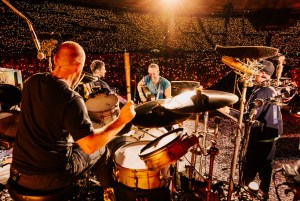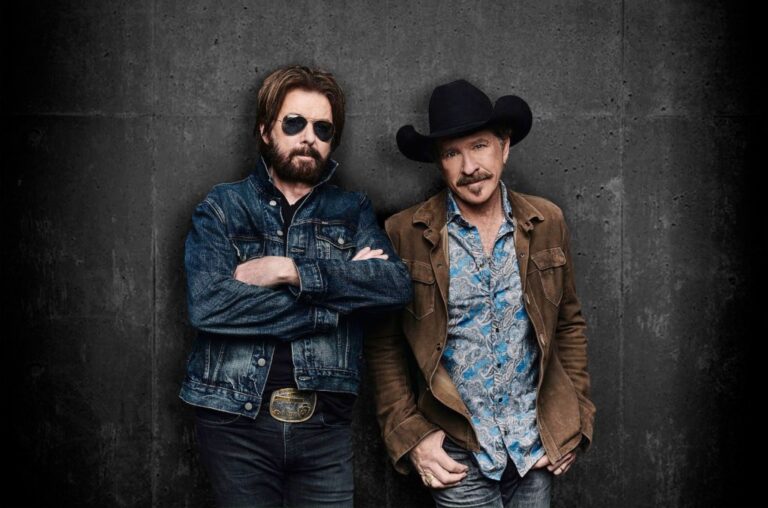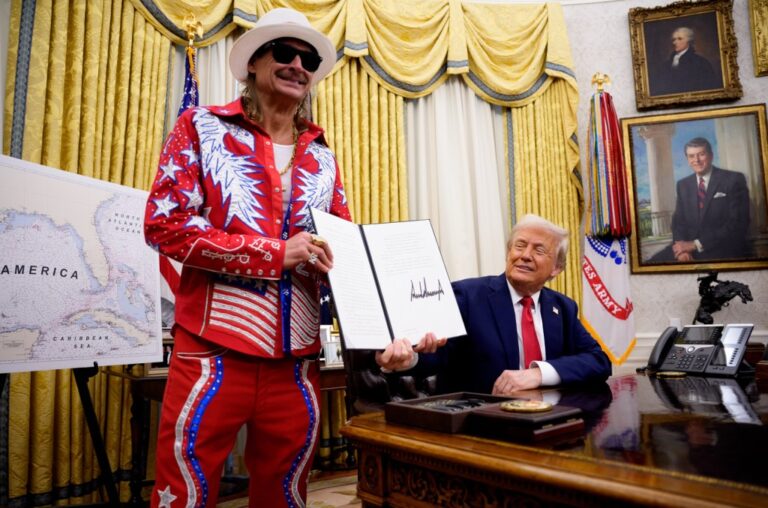Last week, Coldplay teased their upcoming U.K. tour in a fairly low-key way. A vintage flyer from one of their early gigs in 1998 was discreetly displayed at Camden music venue The Dublin Castle in London, and contained news of a run of shows that the band were set to announce for August 2025. But it featured a big statement that could throw a lifeline to the grassroots music scene: scrawled in pen at the bottom of the poster, it announced that 10% of proceeds were to go to “small venues and upcoming acts”.
When the band formally announced the run of next year’s shows in London and Hull, the scale of the message became clear. They confirmed that 10% of all revenue generated at their eight stadium shows next summer will be donated to the scene and that the concerts’ promoters (SJM Concerts, Metropolis Music and Live Nation), the band’s booking agent (WME), the venues (Wembley Stadium and Hull Craven Park) and the official ticket agents (Ticketmaster, See Tickets and AXS) would all do the same.
Trending on Billboard
This will be no small figure. For context, the Music Of The Spheres tour was recently named the biggest rock tour of all time and passed the $1 billion (USD) gross mark for the full run of shows that began in 2022. Coldplay remain a big ticket seller and their run of eleven shows in July 2024 grossed $66 million according to Billboard Boxscore figures. Even once production costs and more are deducted, the donation from these U.K. shows will be seismic.
Music Venues Trust will be at the heart of the project alongside Save Our Scene and other key stakeholders. It arrives at a critical juncture for the U.K.’s music scene. Figures from the MVT reported that 125 venues had closed in 2023, and that places like North West England have suffered more than anywhere else.
Mark Davyd, MVT’s founder and CEO, has been vocal about the challenges at hand and what needs to be done to protect and re-energise the U.K.’s scene. The newly-elected Labour government has made positive noises about a mandatory ticket levy on large-scale music events in the country to be reinvested to the grassroots scene.
Talk is cheap, but Coldplay – who release new album Moon Music on Oct. 4 – have put their money where their mouth is. They follow British rock band Enter Shikari who partnered with the MVT in 2023 to donate £1 from every ticket sale to help safeguard the scene’s future.
Following the announcement, Davyd spoke to Billboard about the state of the grassroots music industry, and what Coldplay’s donation will do for its future.
How did this collaboration come about with Coldplay?
Davyd: “The conversations began in December 2023 and came directly from the band and their management. The band were very concerned about what was happening to grassroots venues and touring, and had worked with their management to think about who they should be in contact with. They reached out to an organization called Save Our Scene run by George Fleming, who very graciously in turn recommended speaking to the Music Venues Trust. By February 2024, it had been agreed that when they announced their 2025 shows, that they’d be making a contribution to the grassroots to support the venues, artists and promoters.”
Did you ever feel like it might not come to fruition and that there would be opposition to a move this seismic?
“We’re hyper-aware that there are lots of companies who would at least like to slow this process down if not completely avoid it, which is a bit depressing as it is the music industry itself that is the beneficiary of schemes like this with support for new and emerging artists. I try to press the point that, ultimately, financial support into the grassroots ecosystem will create the talent of the future from which people make lots of money.
But ultimately we all do respond to what the artists tell us that they want. If it’s an artist the stature of Chris and the lads and they want something to be done, people are going to find a way to get it done. I’m a huge admirer of their other work including making their concerts carbon-neutral, and I think that’s a good example of something that is important to the band and important to the management and everyone in the ecosystem around them.”
Coldplay
Anna Lee
It must feel extra pleasing that it was Coldplay, a band that has been on the exact journey you’re trying to protect.
“The vast majority of artists that are headlining stadiums have a story about their progress through the music industry that nearly always includes grassroots venues. Even Dua Lipa played a load of smaller venues at the start of her career.
This particular one has a ring of authenticity to it. In fact, I actually booked Coldplay three times at Tunbridge Wells Forum about 25 years ago! I think the band and the management around them very much understand these arguments and conversations about why waterfalling music down to the grassroots is so important.”
What will the money do for the grassroots music scene?
“We will be ringfencing this money as this type of money must achieve a number of things. It’s not just about venues, it’s also about artists and promoters. It’s about getting more artists into more venues into more places across the U.K.
There are certainly some things that venues would benefit from: there are venues, for example, that aren’t accessible where we can put some support behind that so more people can use it. Because of the nature of where this money comes from, I think we will be looking at what we can do regarding energy consumption in venues, too.
We want to create something that’s really impactful, meaningful and we want every pound to do something constructive. Everybody in the industry knows that there is a real crisis at grassroots touring. There’s fewer tours as artists can’t afford to play them, but also the length of the tours is a real challenge alongside the locations of where they’re going.
The first tour Oasis did back in 1994, for example, was 34 shows long. There is no band playing that level of shows at grassroots levels anymore. It just isn’t happening. That means that vast swathes of the country are not able to see emerging bands and artists as they’re coming onto the market.”
Do you believe the pipeline from grassroots to stadium is still possible?
“I think it’s still possible. We’ve been doing it for 60 years. There is no lack of enthusiasm for live music. We’re selling more tickets than ever across all sectors, but we’re selling them to a decreasing demographic across the population. So this is a project not just for the artists, but creating future music consumers.”
Do you have an idea on how much this donation might end up totalling?
“I don’t at this stage. We’re not being evasive about that, but there are a number of things in play about their production costs and obviously we don’t know those yet. But we do know that 10% of a stadium run is a sizeable amount and will have a significant impact. This will mean that venues stop closing, that tours can happen and that promoters can take risks on bands that really need support but don’t have the money to make that happen. It is that impactful. It won’t be geographically located in one place, it’ll be spread right across the UK. We’ll see more shows happening with better facilities at venues; this money will achieve a lot.”
The Oasis ticket scandal in the U.K. reignited the discussion about how tickets are sold, the value of them and what could be done on these big tours to support the future of music. What was your response?
“I was disappointed with the Oasis thing, mainly because if you go back to the Commons select committee hearings in March, you can read the words of the representatives of the music industry saying to MPs that they know about the problem with grassroots venues and that they’re going to get it solved. At the point when they were saying that, Coldplay had already made that decision and taken a leadership position while apparently the music industry was working on solutions… but we haven’t seen any solutions of that work that the industry said they were going to undertake.
Everyone’s talking about Oasis but I can throw out other names. There were show announcements for Catfish and The Bottleman and Glass Animals right around the same time. These are artists that if you asked them, would completely understand that the grassroots is important and that music in our communities is important, so why isn’t there contribution from those shows? I’m not blaming anyone, but if we’re going to stand in parliament and say that we’re going to sort this out, let’s sort this out.”
Will the MVT be looking to collaborate with more artists like this going forward?
“Absolutely, our door is very open to anyone on this topic. I want this to become the new normal – I don’t think that’s stupidly ambitious. There are lots and lots of examples of industries – all properly functioning industries – to reinvest to get future gains. As soon as you start talking about it as an investment program into research and development, I don’t think companies should be resistant to that but should be thinking, ‘that makes perfect sense’.”




